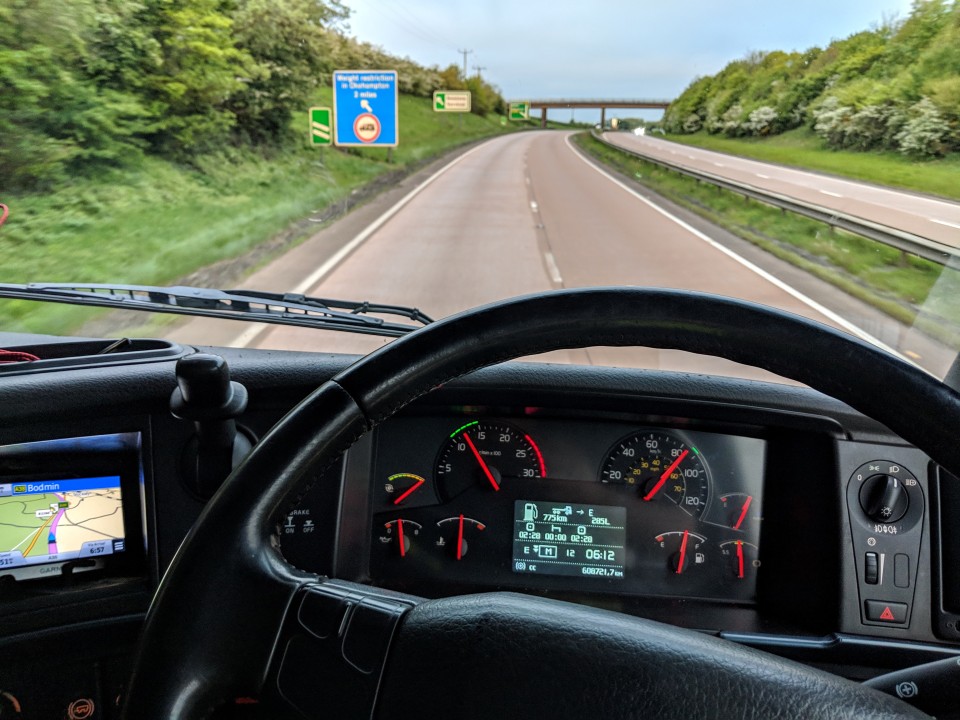
Susie Jones
Como ser um camionista saudável
Criado: 27/08/2024
•
Atualizado: 27/08/2024
Sendo uma profissão exigente, a condução de camiões implica frequentemente longas horas de trabalho, um estilo de vida sedentário e períodos prolongados fora de casa, o que pode afetar a saúde de muitos condutores.
Hábitos pouco saudáveis, como o consumo de fast food, a falta de atividade física e padrões de sono perturbadores podem conduzir a potenciais complicações de saúde no futuro. Mas como manter a forma enquanto camionista? É mais fácil falar do que fazer, mas compilámos uma lista de dicas para o ajudar a manter-se no seu melhor enquanto está na estrada.
Seis dicas para se manter saudável na estrada
Hidratação
Uma dica simples e um bem que muitas vezes tomamos como garantido, no entanto, a maioria dos problemas de saúde ocorrem devido à desidratação. Beber regularmente um pouco de água ou abóbora ao longo do dia expulsa os resíduos metabólicos e as toxinas do seu sistema e mantém-no mais energizado e alerta. Manter uma garrafa de água recarregável consigo não só o lembrará de se manter hidratado, como também é melhor para o ambiente.
Dieta
A tentação da fast food depois de um longo dia é algo com que todos nos podemos identificar, no entanto, tal como manter-se hidratado, a sua dieta desempenha um papel significativo na sua saúde, bem como na forma como se vai sentir ao longo do dia.
Recomenda-se que os condutores de camiões comam três a quatro vezes por dia, duas refeições e dois lanches ou duas refeições e um lanche. Tente manter um plano de refeições e lanches que seja rico em ómega 3, ferro e vitamina C, como vegetais de folha verde, peixe e frutas. Evite o consumo frequente de alimentos e bebidas como massas, pão, bebidas açucaradas e estimulantes como o café e as bebidas energéticas.
Veja a nossa lista de snacks saudáveis para ter no seu táxi:
Barras de cereais
Barras energéticas
Pipocas
Nozes
Frutos secos
Chocolate preto
Para além de comprar alimentos saudáveis quando está em viagem, por vezes pode ser mais saudável e mais económico preparar as refeições. A [Frieghtech] (https://freightech.us/easy-meal-ideas-for-truck-drivers/) tem uma fantástica seleção de receitas para o ajudar a manter uma dieta saudável durante o trabalho.
3.Dormir
Devido à natureza do trabalho, dormir o suficiente pode ser difícil para um camionista e pode levar a resultados devastadores para todos na estrada.
Dicas e truques simples, como os que se seguem, podem ajudá-lo a ter uma boa noite de sono:
Crie um ambiente na cabina que o faça sentir-se em casa. Veja o nosso post sobre como fazer da cabina do camião uma casa
Mantenha a sua área de dormir escura
Um duche quente: Utilize a nossa página maps para saber quais as paragens de camiões que oferecem este serviço
Experimente algumas aplicações para o ajudar a dormir
Encontre o local ideal para estacionar com pouco ruído e perturbações. A nossa aplicação intruck oferece-lhe 5.000 locais para veículos pesados de mercadorias (HGV) em toda a Europa, enquanto a nossa equipa [SNAP Access and Security] (https://snapaccessandsecurity.com/) pode fornecer soluções de segurança personalizadas, permitindo-lhe ter uma melhor noite de sono sabendo que você e o seu camião estão seguros.
Exercício
Uma das dicas mais difíceis de seguir enquanto está na estrada, mas importante, no entanto. Longas horas sentadas ao longo do dia podem levar a uma má postura, dores nas costas e potenciais complicações de saúde. Após um longo dia ao volante, pode ser tentador sentar-se e relaxar, no entanto, uns rápidos 15 minutos de atividade como caminhar ou fazer alongamentos podem fazê-lo sentir-se rejuvenescido e menos stressado.
A [HMD Trucking] (https://www.hmdtrucking.com/blog/truck-driver-exercises-workout/) tem alguns exercícios úteis adaptados aos condutores de camiões, caso pretenda incorporar vários tipos de exercício físico na sua rotina.
Vitaminas
Estar na estrada a tempo inteiro pode dificultar a obtenção de todas as vitaminas necessárias. Tomar um multivitamínico todos os dias pode reforçar o seu sistema imunitário e ajudá-lo a manter-se saudável.
Saúde mental
Sabemos que cuidar da sua saúde física na estrada é importante, mas quanto tempo é que os condutores de camiões dedicam à sua saúde mental?

A instituição de caridade para a saúde mental Mind divulgou estatísticas que revelam que 30% das doenças relacionadas com o trabalho comunicadas pelos próprios no sector dos transportes e da logística se devem à ansiedade, à solidão, ao stress e à depressão. A instituição também insinuou que este número poderia ser mais elevado, uma vez que a maioria das pessoas não procura a ajuda de que necessita. Para além disso, 95% das pessoas que se ausentam do trabalho por doença não revelam a verdadeira razão da sua ausência, se esta estiver relacionada com a sua saúde mental.
Seguir as dicas e truques acima referidos pode ter um efeito positivo na sua saúde mental. Além disso, é importante ter conversas abertas e honestas com outros condutores de camiões, supervisores ou expedidores.
O exercício pode fazer de si um melhor condutor?
Um estilo de vida saudável não só conduz a uma melhor saúde mental, como também pode fazer de si um melhor condutor. Um estudo demonstrou que os condutores a quem foi pedido que fizessem exercício diariamente revelaram maior facilidade em virar a cabeça, conseguiam rodar mais o corpo e conseguiam entrar no carro mais rapidamente.
Qual é a parte mais difícil de ser um camionista?
As longas horas parecem ser um dos aspectos mais difíceis da condução de camiões. Os camionistas são frequentemente confrontados com longos quilómetros a percorrer e horas anti-sociais. Estes longos quilómetros e horas anti-sociais podem levar a um estilo de vida pouco saudável.

Quão pouco saudável é ser camionista?
Devido ao estilo de vida de muitos camionistas, em média, estes são estatisticamente mais propensos a ter problemas de saúde em comparação com pessoas de outras carreiras. Os camionistas enfrentam frequentemente alguns obstáculos, tais como espaços de trabalho apertados, situações de stress, padrões de sono invulgares e falta de alimentação nutritiva, que têm todos influência na sua saúde.
Manter um estilo de vida saudável como camionista exige um esforço consciente, mas os benefícios de o fazer valem bem a pena. As dicas acima permitir-lhe-ão assumir o controlo da sua saúde e melhorar o seu bem-estar. Fique atento a mais dicas e truques da SNAP.



